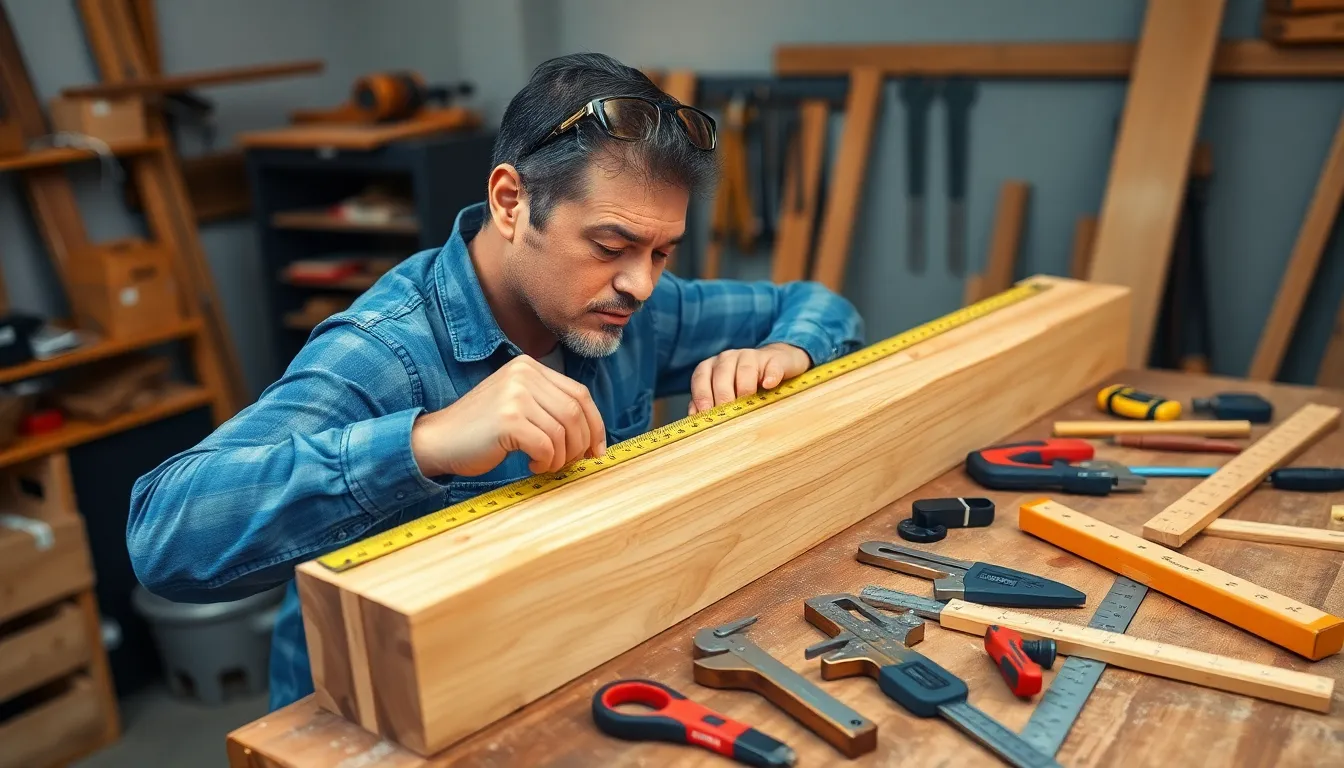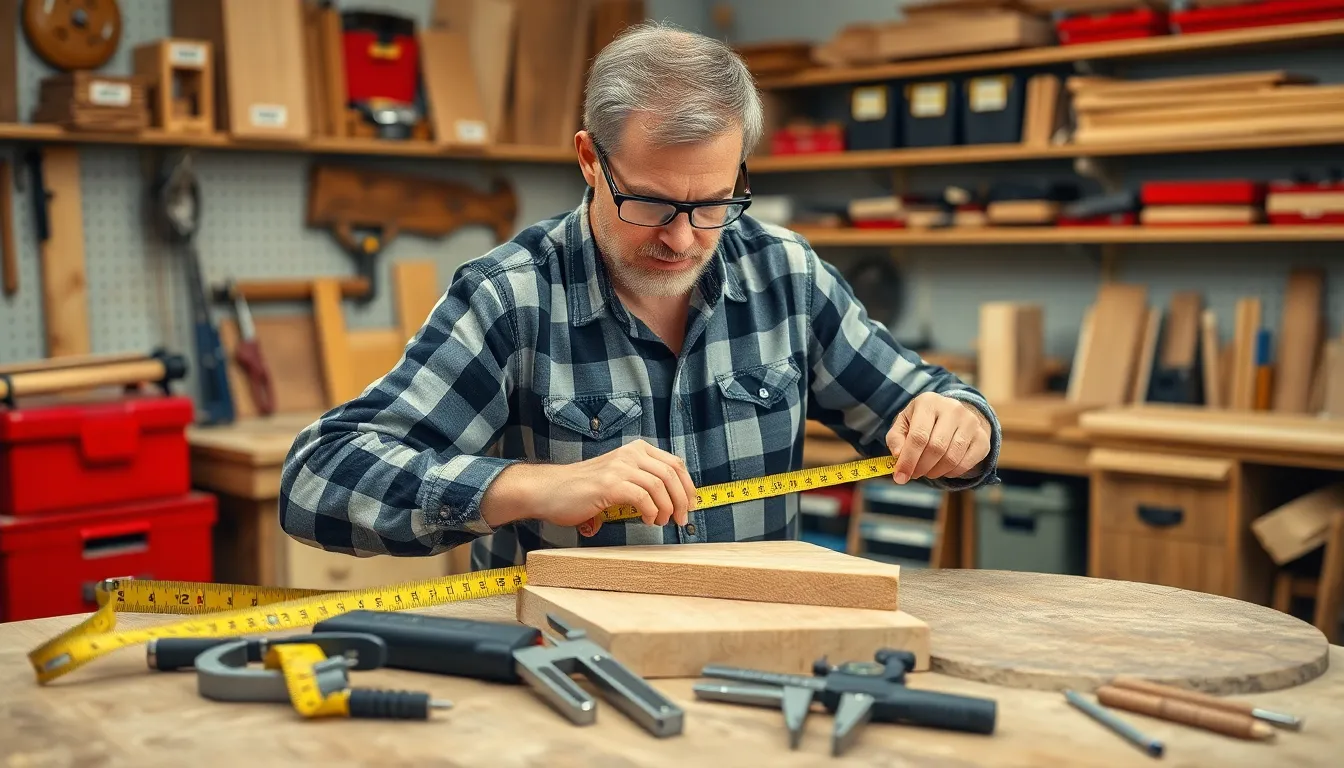In the world of workshops, measuring tools are the unsung heroes, quietly ensuring that every project is a masterpiece rather than a disaster. Imagine trying to build a birdhouse without a tape measure—unless the birds are into abstract art, that’d be a hard pass! These tools not only save time but also prevent those awkward moments when a project doesn’t quite fit, like trying to squeeze a sofa into a tiny apartment.
Table of Contents
ToggleOverview Of Measuring Tools In Workshop
Measuring tools serve a fundamental role in any workshop, ensuring precision in projects. Various types offer unique functionalities to meet different needs. Rulers, for instance, provide a straightforward way to measure lengths accurately. Their simplicity makes them indispensable for basic tasks.
Tape measures excel in measuring longer distances, making them practical for larger projects. They typically extend to 25 feet or more, allowing for flexibility in workspace usage. Calipers measure internal and external dimensions with high accuracy, which is critical for detailed work.
Squares help achieve right angles and verify squareness in materials. Woodworkers rely on framing squares to ensure joints fit perfectly. Additionally, levels indicate whether surfaces are even, preventing uneven structures that could lead to project failure.
Digital measuring tools, like laser distance measuring devices, improve speed and accuracy. These devices cut measurement time significantly and reduce human error. Each type of measuring tool contributes to a streamlined workflow, enhancing productivity in any workshop environment.
Ultimately, using the right measuring tools increases overall efficiency. They help avoid common pitfalls associated with imprecision, saving time and resources. Accurate measurements lay the foundation for successful project completion, exemplified by the building of a birdhouse.
Types Of Measuring Tools

Measuring tools in a workshop come in various forms, each tailored for specific tasks. Understanding these tools improves project accuracy and efficiency.
Length Measurement Tools
Length measurement tools provide the foundation for precise measurements. Rulers serve as basic yet effective tools for measuring short lengths, commonly used in woodworking and crafting. Tape measures extend much further, often 25 feet or more, making them ideal for larger projects. They allow users to easily measure distances often beyond arm’s reach. Calipers excel in size measurements, with capabilities to measure both internal and external dimensions accurately. These tools ensure that components fit together perfectly, crucial for detailed assemblies. Accuracy in length measurement plays a significant role in successful project outcomes.
Angle Measurement Tools
Angle measurement tools ensure that angles are measured accurately for structural integrity. Squares are fundamental for creating right angles, essential in aligning and constructing frameworks. They prevent errors that could lead to instability in projects. Protractors enable users to measure angles with greater precision, commonly used in projects requiring angular cuts. Digital angle finders enhance accuracy further, providing quick readings of angles and showing measurements on digital screens for easy interpretation. With accurate angle measurements, projects maintain their intended design and function.
Height Measurement Tools
Height measurement tools assist in determining vertical distances accurately. Using a leveling tool guarantees surfaces are even, which is vital for stability and aesthetics in construction. Staff gauges offer a straightforward method for measuring height, commonly used in woodworking and metalworking. Laser height finders simplify this process by providing quick, precise measurements without cumbersome setups. These tools also minimize human error, ensuring that heights remain consistent throughout a project. Maintaining accurate height measurements supports the overall quality and success of workshop tasks.
Importance Of Accurate Measurements
Accurate measurements play a crucial role in workshop environments, directly influencing project outcomes. Ensuring precision in measurements leads to better quality work and helps prevent costly mistakes.
Impact On Project Quality
Consistent accuracy in measurements enhances project quality. Projects, such as building furniture or assembling structures, require precise dimensions for proper fit and functionality. When measurements are off, even slightly, it can compromise the integrity and aesthetic appeal of the final product. Correct measurements lead to stable constructions and reduce the likelihood of rework, which wastes resources and time. Utilizing accurate measuring tools solidifies reliability in projects, ensuring each task can meet expected standards.
Time Efficiency
Accurate measurements contribute to significant time savings. Correct dimensions eliminate the need for repeated adjustments and corrections during construction. Time spent measuring correctly upfront results in fewer errors and less frustration. Workers can focus on completing tasks rather than redoing them due to miscalculations. Utilizing precise tools, such as laser distance measures, accelerates the measuring process, allowing projects to move forward without delays. Ultimately, investing time in accuracy generates faster project completion rates.
Tips For Choosing The Right Measuring Tools
Selecting the right measuring tools significantly impacts workshop outcomes. Consider the following key factors when choosing tools.
Material Considerations
Choosing the right material for measuring tools affects durability and accuracy. Steel offers longevity, resisting deformation, while aluminum provides a lightweight option. Wood, although less durable, can be suitable for temporary setups. Assessing the environment also matters; for example, stainless steel works well in humid conditions. Users should prioritize tools that match specific project needs to enhance performance.
Tool Precision
Precision is crucial for successful projects. Tools like calipers deliver high accuracy, measuring minute details with ease. Tape measures vary in precision, with some suitable for general use and others designed for professionals. The selection of digital measuring devices provides enhanced accuracy through lasers, significantly reducing human error. Evaluating precision ensures that measurements translate into successful outcomes, directly impacting project quality.
Maintenance Of Measuring Tools
Routine maintenance of measuring tools ensures longevity and accuracy. Inspecting for signs of wear and tear, such as scratches or dents, helps identify issues early. Regular cleaning prevents dirt and dust build-up, which can impair functionality. Using a soft cloth and appropriate cleaning solution maintains tool surfaces.
Calibration plays a crucial role in maintaining precision. Checking calibration regularly guarantees accurate readings, especially with tools like calipers and digital devices. Following manufacturer guidelines for calibration intervals ensures optimal performance over time.
Storage conditions significantly influence the lifespan of measuring tools. Keeping tools in a dry, temperature-controlled environment prevents rust and corrosion, particularly for steel and stainless steel tools. Using toolboxes or wall-mounted racks helps organize tools and keeps them protected.
Handling techniques also matter in maintaining tool integrity. Using measuring tools correctly prevents damage from misuse or excessive force. For instance, not applying too much pressure on a tape measure during use preserves its spring mechanism.
Replacing worn-out tools is essential for maintaining overall workshop efficiency. Recognizing when a tool no longer provides reliable measurements allows for timely replacements. Investing in high-quality measuring tools initially can reduce replacement frequency and enhance project outcomes.
Ensuring that any battery-operated tools have fresh batteries or charge will keep them consistently functional. Rotating the use of tools distributes wear evenly, extending the life of each tool. Prioritizing maintenance not only safeguards tool investment but also enhances the quality of work completed in the workshop.
Measuring tools are indispensable in any workshop. They ensure precision and efficiency, directly impacting the quality of projects. By investing in the right tools and maintaining them properly, individuals can avoid costly mistakes and enhance their overall productivity.
The diverse range of measuring tools available caters to various needs, from basic length measurements to intricate angle and height assessments. Choosing the right tool for specific tasks is crucial for achieving accurate results.
Ultimately, the commitment to using and caring for measuring tools not only improves project outcomes but also fosters a more enjoyable and successful workshop experience. Prioritizing precision lays the groundwork for creativity and craftsmanship in any endeavor.




